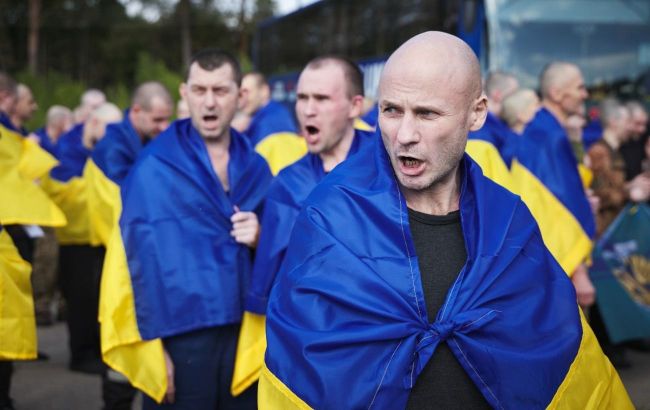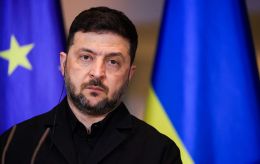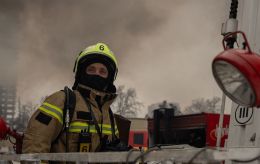Ukraine and Russia conduct first stage of 1,000-for-1,000 prisoner exchange: Details (photos, videos)
 Photo: the first stage of the prisoner exchange between Ukraine and Russia took place (t.me/V_Zelenskiy_official)
Photo: the first stage of the prisoner exchange between Ukraine and Russia took place (t.me/V_Zelenskiy_official)
Ukraine and Russia conducted the first stage of the prisoner exchange in the format 1000 for 1000. Overall, the process will last three days.
Read more about the first stage of the big exchange in RBC-Ukraine's report.
Ukrainian President Volodymyr Zelenskyy stated that Ukraine and Russia have carried out the first part of the 1000 for 1000 exchange agreement.
Photo: 390 Ukrainians returned home from Russian captivity (t.me/V_Zelenskiy_official)
"Today — 390 people. On Saturday and Sunday, we expect the exchange to continue," he said.
The head of state thanked everyone who helps and works around the clock to ensure that Ukrainians return home.
"It is very important to bring back everyone who is in captivity. We are verifying every name and information about each person. We will continue our diplomatic efforts to make such steps possible," he added.
Who was returned home
The Coordination Headquarters for the Treatment of Prisoners of War clarified that 270 military personnel and 120 civilians were returned home.
"These are servicemen of the Armed Forces of Ukraine, including the Navy, Air Assault Forces, Territorial Defense Forces, as well as the National Guard of Ukraine and the State Border Guard Service of Ukraine," they added.
The freed soldiers defended Ukrainian territory in the Donetsk, Luhansk, Kharkiv, Zaporizhzhia, and Kherson directions, and also took part in battles in the Chernihiv, Sumy, and Kyiv regions.
Among those released were three women and 387 men. After the exchange, they will undergo medical examinations, receive assistance with physical and psychological rehabilitation, be granted all due payments for the entire period of captivity, and reintegrate into society.
What criteria were used to form the lists
Ukraine’s Defense Minister Rustem Umerov said that all the bodies responsible for the exchange acted as a single team. They wanted to bring Ukrainians out of captivity as quickly as possible.
"Military and civilians. Men and women. Each one of them is ours. The lists were formed based on one criterion — to save lives. Under the Istanbul agreements, we expect new exchanges that will last several days," the official said.
He added that the Ukrainian authorities will continue working to return all imprisoned defenders and civilians.
Ukraine exchanged collaborators
The Khochu k svoim project reported that as part of today’s exchange, Ukraine handed over 70 collaborators to Russia. In return, dozens of Ukrainian civilian hostages were released from Russian captivity.
The Russian authorities had been unlawfully holding the returned Ukrainians for years.
Ukraine and Russia agreed on the 1,000 for 1,000 prisoner exchange format
On May 16, 2025, the first meeting in three years between the Ukrainian and Russian delegations took place in Istanbul. During the negotiations, an agreement was reached to release prisoners according to the 1,000 for 1,000 formula.
The head of the Ukrainian delegation, Ukraine’s Minister of Defense Rustem Umerov, announced the results immediately after the meeting. His Russian counterpart, Vladimir Medinsky, also confirmed the agreement.
As reported by CNN, citing a Turkish official, the initiative for the prisoner exchange came from Türkiye. According to him, at a moment when the situation seemed hopeless, Ankara proposed the prisoner swap.
After that, active preparations began. Vadym Skibitskyi, a representative of Ukraine’s Defense Intelligence, announced the start of compiling lists for the exchange. Meanwhile, the Security Service of Ukraine (SSU) reported on the preparatory measures of the Joint Coordination Center for the release of prisoners.
Among other things, the necessary infrastructure, locations, and medical personnel required for receiving, escorting, and rehabilitating Ukrainian military personnel were being prepared.
At a briefing on May 19, President Volodymyr Zelenskyy stated that the 1,000 for 1,000 exchange concerns prisoners of war. He emphasized that prisoner exchanges must exclusively involve military personnel, while civilians and children should be returned unconditionally.
"We signaled about political prisoners and journalists on our side. I do not want to go into details now. Exchanging children for soldiers, it seems to me… honestly, we do not support such an approach," Zelenskyy said.
Within a few days of the agreement, Umerov announced an agreed step-by-step plan for implementing the exchange, taking into account humanitarian, security, and logistical aspects.
On Thursday, May 22, it became known that Ukraine had handed over a list to Russia for the upcoming exchange. The Kremlin confirmed that it had received the list and sent its own list to Ukraine.
The President of Ukraine, in turn, stated that every name submitted by the Russian side was being carefully checked. Later, Head of the Office of the President Andriy Yermak confirmed that the Ukrainian side had completed all preparatory measures. Now it is Russia’s turn to implement the agreement as soon as possible.
At the same time, yesterday, Russia announced that the exchange process in the 1,000 for 1,000 format could take several days due to technical difficulties. Today, RBC-Ukraine sources confirmed that the process will last three days.
What the previous prisoner exchange was like
Before this, a prisoner exchange between Ukraine and Russia took place on May 6, 2025. At that time, 205 servicemen were successfully returned home. Overall, it was the fifth exchange since the beginning of this year and the 64th since the start of Russia’s full-scale invasion of Ukraine.
Among those released were 3 officers and 202 soldiers and sergeants, specifically representatives of the Armed Forces of Ukraine, including the Navy, Air Force, Air Assault Forces, Territorial Defense Forces, as well as the National Guard of Ukraine and the State Border Guard Service of Ukraine.
The freed defenders had defended Ukraine in the Donetsk and Luhansk directions, Zaporizhzhia and Kharkiv regions, Kherson, Sumy, and Kyiv regions, and among those released were defenders from the Mariupol garrison.
The Verkhovna Rada Commissioner for Human Rights, Dmytro Lubinets, previously stated that the UAE currently serves as the main mediator in the return of Ukrainians from Russian captivity.

